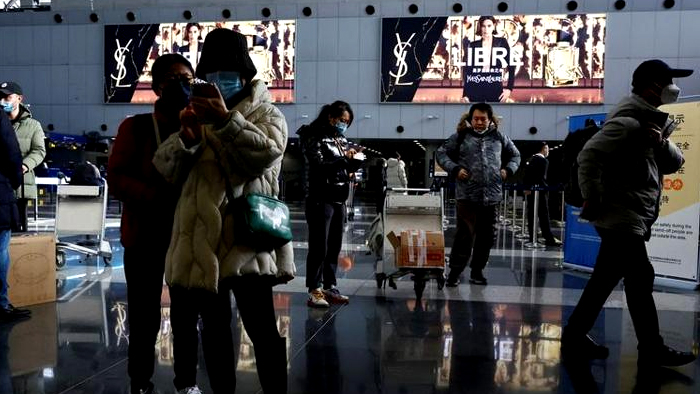Wednesday, hospitals and funeral homes in China were under a lot of pressure because of the COVID-19 outbreak. The size of the outbreak and questions about the accuracy of official data have led some countries to think about changing their travel rules for Chinese tourists.
In a sudden shift in policy, China started tearing down the world’s strictest COVID system of lockdowns and thorough testing this month. This will help its battered economy fully reopen next year.
After a lot of people protested against the restrictions, they were lifted. This means that COVID is spreading mostly unchecked and probably infecting millions of people every day, say some international health experts.
Related: China will give more money to the tourism and catering industries that have been hurt by COVID.
China was the last major country in the world to start treating the virus as endemic. The speed with which it got rid of COVID rules has put a lot of stress on its already weak health system.
China reported three new COVID-related deaths on Tuesday, up from one on Monday. These numbers don’t match what funeral homes are saying or what other countries with much smaller populations have seen after their borders reopened.
The staff at Huaxi, a large hospital in the city of Chengdu in the southwest of China, said they were “extremely busy” taking care of COVID patients.
“I’ve been doing this for 30 years, and this is the busiest I’ve ever seen it,” said an unnamed ambulance driver outside the hospital.
On Tuesday night, there were long lines inside and outside the emergency room of the hospital and at a fever clinic next door. Most of the people who came in ambulances got oxygen to help them breathe.
“Almost all of the patients have COVID,” said a pharmacy worker in the emergency room.
She said that the hospital doesn’t have any medicines for COVID and can only give medicines for symptoms like coughing.
The parking lots near the Dongjiao funeral home, which is one of Chengdu’s biggest, were full. As smoke rose from the crematorium, funerals went on all the time.
One funeral worker said, “We have to do this about 200 times a day now.” “We’re so busy that we can’t even eat. Since the beginning, this has been the case. Before, between 30 and 50 a day.”
“”COVID has killed a lot of people,” said another worker.
At the privately owned Nanling crematorium in Chengdu, staff were just as busy.
“COVID is killing so many people these days,” one worker said. “There are no more funeral slots available. You won’t be able to get one until the new year, at the earliest on January 3.”
China has said that COVID-related deaths are only counted when they are caused by pneumonia or a lack of air.
Zhang Yuhua, a worker at the Beijing Chaoyang Hospital, said that most of the most recent patients were old and very sick with diseases that went deeper. She said that the number of people getting emergency care had gone up from about 100 to 450–550 per day, as reported by state media.
State media said that the fever clinic at Beijing’s China-Japan Friendship Hospital was also “packed” with older people.
Nurses and doctors have been asked to work while sick and retired medical workers in rural areas were brought back to work. Some cities have had trouble getting enough anti-fever medicines.
HOW TO TRAVEL
China will no longer require travellers coming into the country to go through quarantine starting on January 8. This is a big step toward making travel easier and has led many Chinese people, who have been cut off from the rest of the world for so long, to check travel sites.
But on Tuesday, the number of people looking for flights online went up from a very low level. Residents and travel agencies said it would be a few months before things were back to normal, as people are still being cautious.
Also, some governments were thinking about making it harder for Chinese tourists to travel.
The reason given by U.S. officials was “the lack of transparent data.”
India and Japan would require travellers from mainland China to pass a COVID test. Those who failed the test in Japan would have to spend a week in quarantine. Tokyo also wants to stop airlines from going to China more.
The Philippines was also thinking about putting tests in place “.
ECONOMIC PAIN
As workers and shoppers get sick, factory output and domestic consumption are likely to slow down in China, which has a $17 trillion economy.
When news came out that borders were opening again, luxury stocks around the world went up, but other parts of the market didn’t react as much.
Related: As COVID rules get easier, Chinese make travel plans.
According to an internal schedule seen by Reuters, the U.S. car company Tesla (NASDAQ:TSLA) plans to make less at its Shanghai plant in January. It didn’t say what the reason was.
Some economists think that once the initial shock of new infections wears off, China’s growth will bounce back with a vengeance. This year, growth is expected to be around 3%, which is the lowest rate in almost 50 years.
Goldman Sachs (NYSE:GS) economists see growth of 5.2% in 2023, while Morgan Stanley (NYSE:MS) economists see growth of 5.4%.

